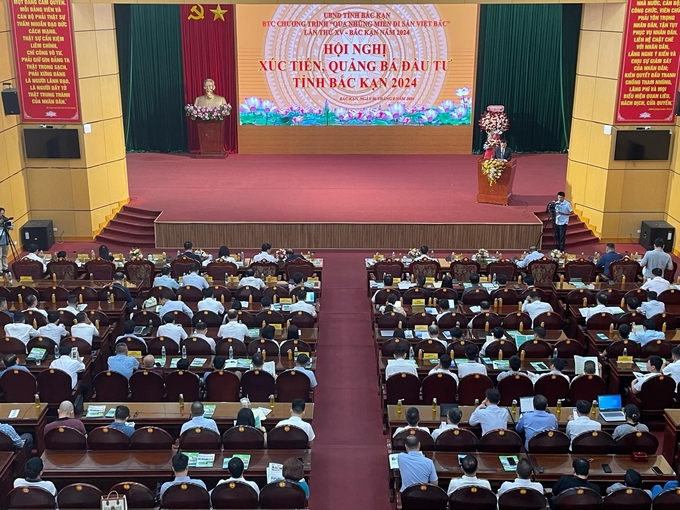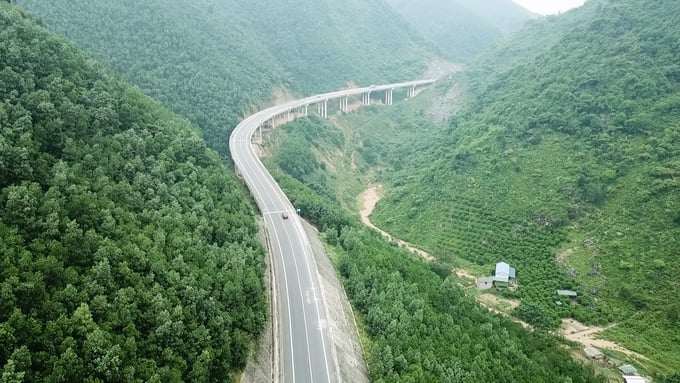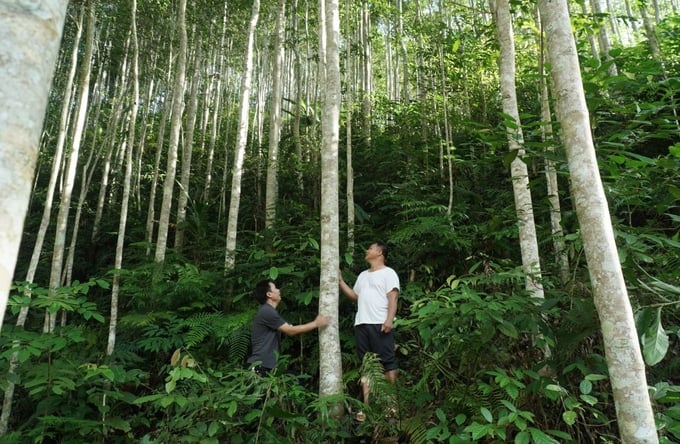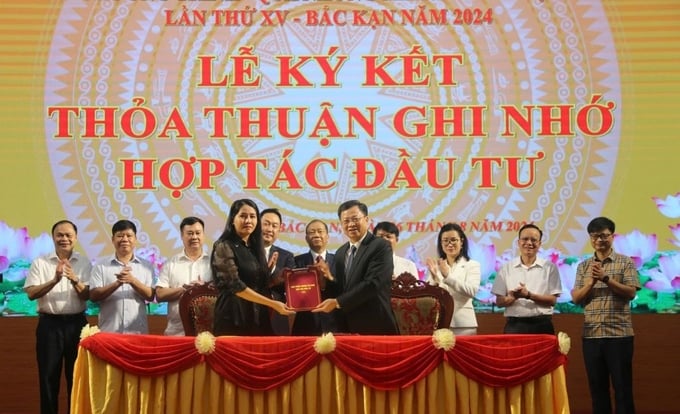November 27, 2025 | 04:39 GMT +7
November 27, 2025 | 04:39 GMT +7
Hotline: 0913.378.918
November 27, 2025 | 04:39 GMT +7
Hotline: 0913.378.918
The Bac Kan Provincial People's Committee held the Bac Kan 2024 Investment Promotion and Advertisement Conference on August 26. The event saw the participation of the provincial leadership as well as various industry associations and business communities.

This year's conference marked a collaboration between the Hai Phong Logistics Association and the Bac Kan Provincial People's Committee in creating sustainable carbon credits through forest planting. Photo: Ngoc Tu.
According to the province's master plan for the years between 2021 and 2030, with a vision towards 2050, Bac Kan aims to become a moderately developed and sustainable province. To achieve this goal, the province is making an active effort to attract investors to its key areas of development.
Regarding infrastructure development progress, the Hanoi - Thai Nguyen - Cao Bang expressway project is currently under construction; the Hanoi - Thai Nguyen - Cho Moi route is currently in operation; the Cho Moi - Bac Kan City route, with four lanes, expects completion by 2026. Additionally, the road connecting Bac Kan City to Ba Be Lake is also under construction, and regional connectivity infrastructure is steadily improving.
Bac Kan Province possesses significant potential for service and tourism development, with Ba Be Lake set to become a National Tourism Site. The province is home to an extensive range of historical sites, with Historical Relics Safety Zone (ATK) Cho Don being a notable highlight. Culturally, Bac Kan boasts several intangible cultural heritages, including the Then singing and Tinh lute belonging to the Tay and Nung ethnic communities; the Sli singing of the Nung community; the Bat dance of the Tay community; and the Cap Sac ceremony of the Dao community.
On the other hand, Bac Kan houses a strong agricultural and forestry sector, with over 417,000 hectares of forest land, including more than 100,000 hectares of planted forest. The region is also known for its specialty agricultural products such as oranges, tea, and seedless persimmons. Additionally, Bac Kan has significant potential for developing medicinal plants.
With the aim of attracting investors, Bac Kan has focused on developing its industrial infrastructure over the years, establishing seven industrial clusters to provide cleared land for development.

The gradually improving transportation system will enable Bac Kan Province to attract an increasing number of investors. Photo: Ngoc Tu.
In recent years, Bac Kan has also strengthened its efforts in establishing an e-government and streamlining administrative procedures, thereby creating a more favorable business and investment environment.
At the 2024 Investment Promotion and Advertisement Conference, Bac Kan Province invited investment in 45 projects. These include 4 real estate projects, 7 tourism and service infrastructure projects, 5 urban infrastructure, commercial, and golf course projects, 5 commercial infrastructure projects, 13 industrial cluster infrastructure development projects, 5 processing projects, and 6 agricultural and forestry projects.

Bac Kan Province possesses significant potential to attract investment in agro-forestry and processing industries. Photo: Ngoc Tu.
Regarding the agricultural and forestry sector, the province is attracting investment in several key projects: a project for the production, tending, and processing of agricultural products in association with eco-tourism; a project to develop concentrated raw material areas for wood, bamboo, and rattan processing; a project for the production, tending, and development of medicinal plants; and a project to establish high-tech fruit-growing areas.
Additionally, Bac Kan seeks investment in four projects to build agro-forestry product processing facilities, one project to establish a slaughterhouse, and one project to build a center for agricultural product display and logistics services.
According to Pham Duy Hung, Vice Chairman of the Bac Kan Provincial People's Committee, the conference is an opportunity for businesses and investors to gain a deeper understanding of the province's opportunities and potential, as well as the province's policies, initiatives, and commitment to promoting the role and responsibility of the business community in the development of Bac Kan as a whole. Moreover, the province is committed to creating a favorable, transparent, and stable long-term investment environment where businesses can grow and prosper in the future.

Four investors signing cooperation agreements with the Bac Kan Provincial People's Committee. Photo: Ngoc Tu.
The conference witnessed the signing of a memorandum of understanding between four investors and Bac Kan Province, along with a separate memorandum of cooperation between businesses with an established presence within the province.
Translated by Nguyen Hai Long

(VAN) Tay Ninh’s livestock sector is undergoing a major transformation, applying high-tech, closed-loop circular models to build sustainable value chains.
/2025/11/26/3627-4-082628_818.jpg)
(VAN) From a small café on the red basalt highlands, Le Van Hoang started a business with clean coffee, building Enjoi Coffee into a symbol of organic agriculture in the Lam Dong plateau.
/2025/11/25/0045-1-135246_13.jpg)
(VAN) Ca Mau is researching a model of sea-encroaching embankments combined with viaducts and logistics service zones, aiming both to prevent erosion and create land funds for marine economic development.

(VAN) The information was shared at the seminar 'Urban Agriculture - Solutions for Developing Green Spaces,' organized by the Kinh te & Do thi Newspaper and the Biotechnology Center of Ho Chi Minh City.
/2025/11/19/4141-2-132831_216.jpg)
(VAN) One of Japfa's outstanding solutions is implementing digital transformation and artificial intelligence (AI) to optimize operations, enhance productivity, and advance sustainable development.
/2025/11/19/4847-1-093540_448.jpg)
(VAN) The Gia Lai Provincial People’s Committee had a working session with the delegation of the U.S. Department of Agriculture, the State of Idaho, and representatives of the State's leading enterprises.

(VAN) Ca Mau has a sufficient foundation to become a strong regional aquaculture center, where production integrates the economy, the environment, and the lives of the people.